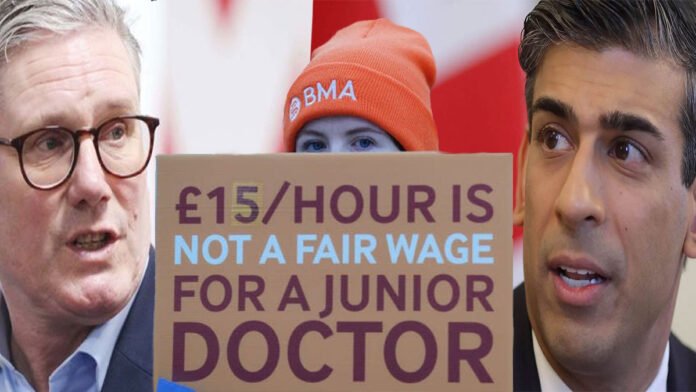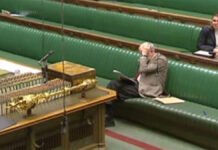The Doctor’s Call: Strike Puts Starmer’s Leadership to the Test
As Britain barrels towards its most consequential general election in a generation, a fresh wave of industrial action is set to bring Keir Starmer’s true colours into sharp relief. With junior doctors announcing a 5-day walkout starting June 27th – just one week before polling day – the Labour leader will face intense scrutiny over whether his “opposition” amounts to anything more than reheated Tory austerity.
While the Conservative government has expectedly doubled down on its entrenched hostility to public sector workers, dismissing the BMA’s pay demands as beyond the realm of affordability, all eyes will be on Starmer. Leading opinion polls by a staggering 27 points, he can no longer rely on the convenience of deflecting from the opposition benches.
No, should Labour’s neoliberal vanguard secure a mandate on July 4th, the onus will immediately fall on Starmer and his shadows like Wes Streeting to articulate a credible plan for resolving this long-running dispute. One that doesn’t simply rehash the same contemptuous union-bashing that has defined over a decade of Tory governance.
Dr Robert Laurenson and Dr Vivek Trivedi, co-chairs of the British Medical Association’s junior doctors committee, said: “We made clear to the government that we would strike unless discussions ended in a credible pay offer.
“For more than 18 months we have been asking Rishi Sunak to put forward proposals to restore the pay junior doctors have lost over the past 15 years – equal to more than a quarter in real terms.
“When we entered mediation with government this month we did so under the impression that we had a functioning government that would soon be making an offer.
“Clearly no offer is now forthcoming. Junior doctors are fed up and out of patience.”
The BMA has asked for a 35% pay rise to compensate for the 15 years of below-inflation pay rises.
The government gave junior doctors in England an 8.8% pay rise last summer, with an extra 3% offered during the last round of negotiations towards the end of the year.
The BMA has rejected the 3% offer because it did not make up for a real-term pay cut of nearly a quarter for junior doctors since 2008.
Labour’s Rubicon: Junior Doctors’ Strike Tests Starmer’s Neoliberal Resolve
Herein lies Starmer’s Rubicon. For all his lofty rhetoric about reviving Labour’s progressive traditions, will he truly break from the small-c conservative economic orthodoxy that has left our public services ravaged? Or will we witness the total obliteration of Labour’s remaining ideological distinctions as he capitulates to the inevitabilities of austerity neoliberalism?
In the past Starmer has echoed the Tories stating. “I don’t think 35% is affordable, but I do think the role of government is to get in the room, around the table, and negotiate a settlement”.
Earlier Today, shadow health secretary Wes Streeting said that he would “not be able to afford” the 35 per cent pay claim being made by the BMA.
He told GMB: “We’re going to have to work together and negotiate on pay and recognise, as was the case with the last Labour government who inherited a similar mess. Getting to fair pay is a journey not an event, and I am willing to negotiate on pay and those wider conditions that junior doctors are working.”
The junior doctors’ stand underlines why this is no ordinary ballot – it represents an existential crisis point for what lingering ethic of democratic socialism still flickers within Labour’s hollowed-out husk. A Starmer victory that fails to reverse the institutional degradation of our NHS would be an ideological decapitation. It would confirm Labour’s transition into the “acceptable” flank of a singularly corporatist political monolith.
So as Britain approaches the polls, let this be a clarion call. Reject the duopolistic facade of Labour and the Tories as genuine alternatives. Demand a true democratic renaissance that restores societal primacy to working people – not the whims of whatever transnational investment vehicles and mercantile cartels are shaping government policy on any given decade.
For should we sleepwalk into endorsing this neoliberal “changing of the guards”, we’ll have nobody to blame but ourselves as the disintegration of our public sphere accelerates. The junior doctors have raised the banner of rejection against immiserating austerity – it falls to the electorate to rally behind that embattled struggle for economic justice.
Help Us Sustain Ad-Free Journalism
Sorry, I Need To Put Out the Begging Bowl
Independent Journalism Needs You
Our unwavering dedication is to provide you with unbiased news, diverse perspectives, and insightful opinions. We're on a mission to ensure that those in positions of power are held accountable for their actions, but we can't do it alone. Labour Heartlands is primarily funded by me, Paul Knaggs, and by the generous contributions of readers like you. Your donations keep us going and help us uphold the principles of independent journalism. Join us in our quest for truth, transparency, and accountability – donate today and be a part of our mission!
Like everyone else, we're facing challenges, and we need your help to stay online and continue providing crucial journalism. Every contribution, no matter how small, goes a long way in helping us thrive. By becoming one of our donors, you become a vital part of our mission to uncover the truth and uphold the values of democracy.
While we maintain our independence from political affiliations, we stand united against corruption, injustice, and the erosion of free speech, truth, and democracy. We believe in the power of accurate information in a democracy, and we consider facts non-negotiable.
Your support, no matter the amount, can make a significant impact. Together, we can make a difference and continue our journey toward a more informed and just society.
Thank you for supporting Labour Heartlands












